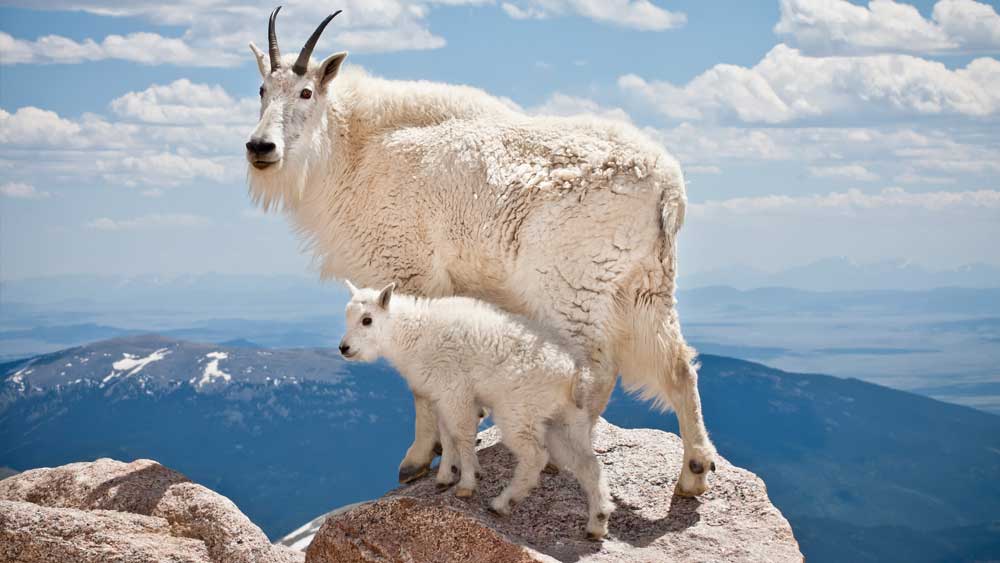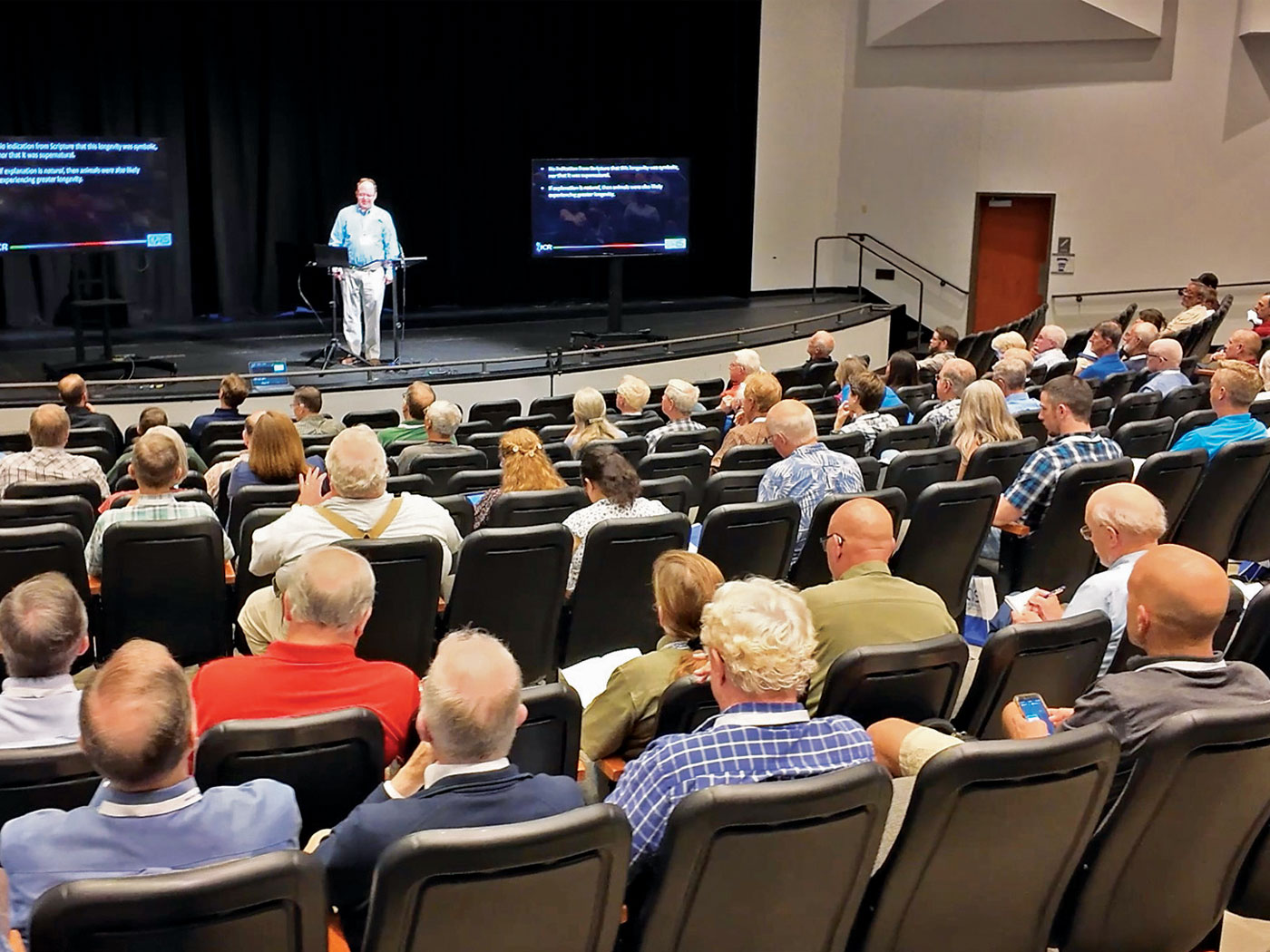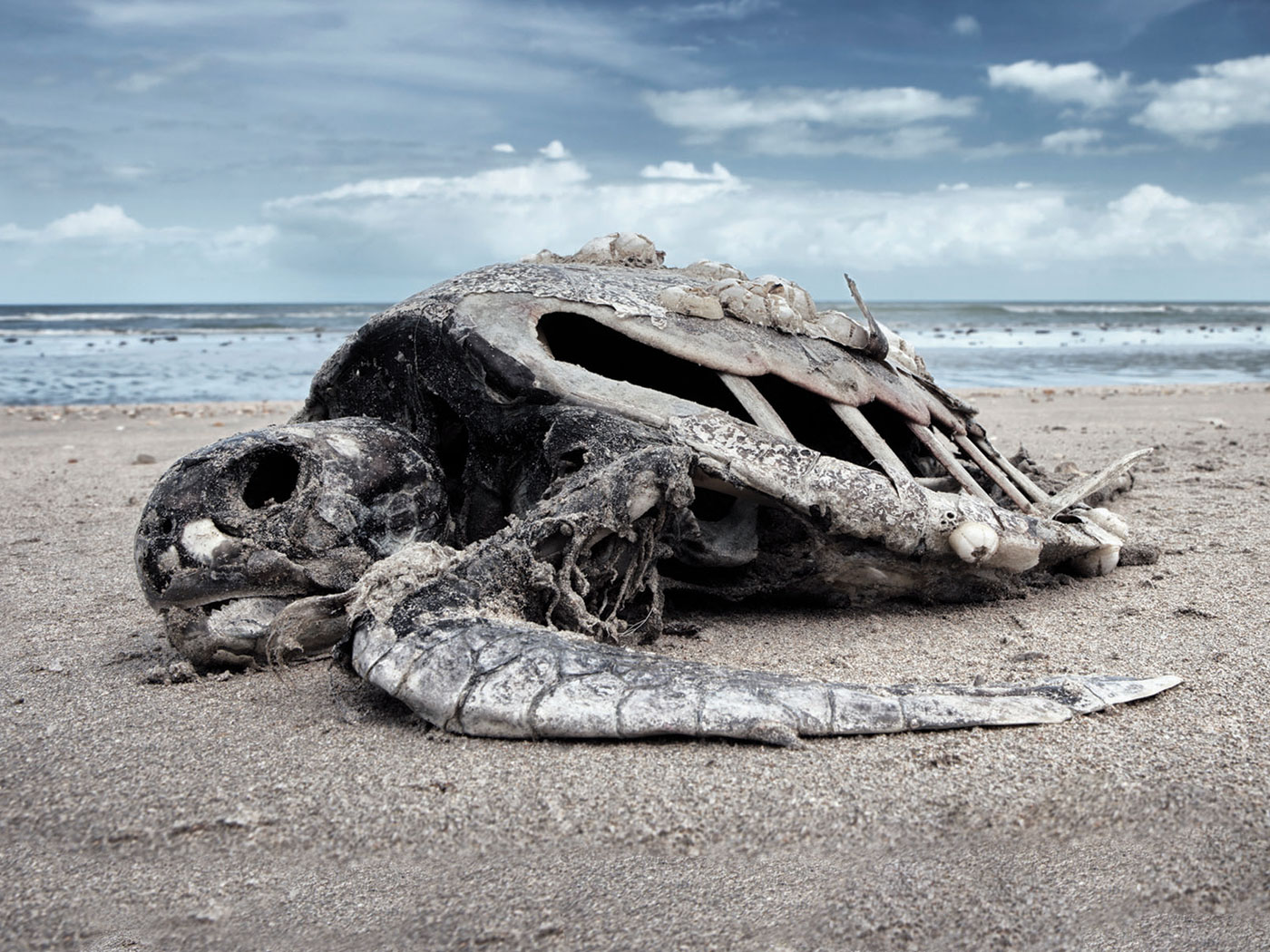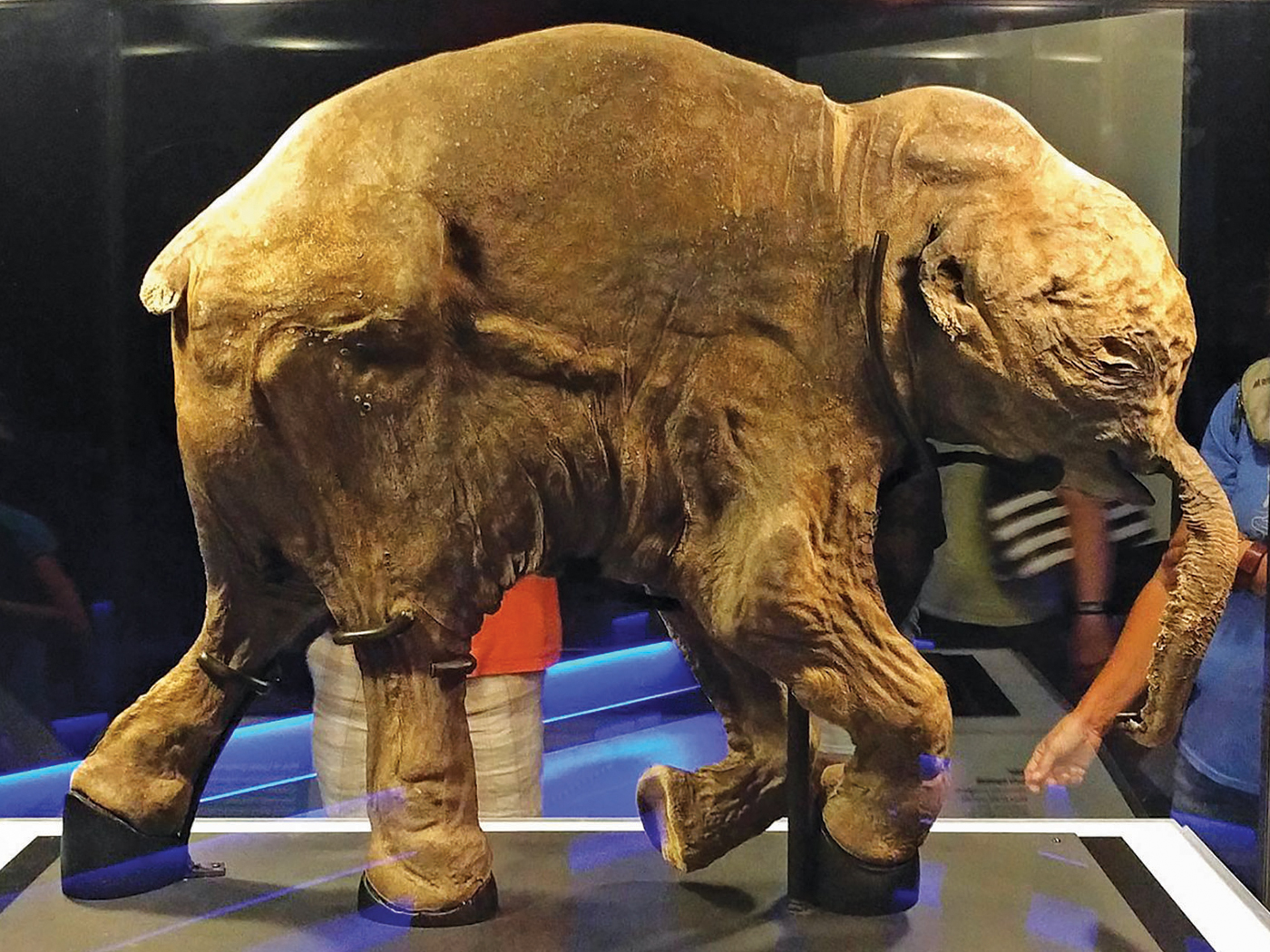Indeed, mountain goats provide creation science gems, plus a picture of how we need balance in the political arena, when healthcare concerns (including panicking citizens) must be balanced against the need to restore America’s economy and other vital aspects of normal daily living.1
Why are mountain goats a picture of this problem? Because safely balancing a mountain goat’s body on steep alpine slopes and safely balancing the most vital needs of a nation’s people are high-risk situations, facing opposing forces and potential disasters. How do you balance healthcare-risk shut-ins against society-destroying shutdowns?
To appreciate this comparison, mountain goats must be appreciated within their real-world habitats, just as the U.S. president (and other government officials) must make decisions that match real-world realities (not just speculative models). Context matters!
Also, both situations—high-altitude mountain goats and high-stakes governmental decision-making—indispensably need God’s providential blessing, in all the many details, or else disaster awaits.2
In other words, mountain goats provide sure-footed creation science exhibits of how much we need God’s wisdom and His providential blessings to safely journey through each day’s rocky challenges.
Consider, first, the agility of a mountain goat (Oreamnos americanus), the sure-hoofed bovid that habituates the heights of North America’s Rocky Mountains and Cascade Range.3
“For those of us who admit to some fear of heights, the Mountain Goat is an animal to be admired … This shaggy animal, its back hunched in a manner somewhat suggestive of a Bison, is a master at negotiating the steepest of precipices. Mountain Goats are truly alpine creatures. They commonly rest on high-elevation snowfields and find most of their food among the plants of alpine meadows. Their hooves are structured to [optimize] balance and grip; the outer hoof is strongly reinforced and the bottom is lined with rubbery material, making the whole structure rather like a good hiking boot. These animals nonchalantly cross dizzying ledges, sometimes even at a trot.”4
In fact, the high-altitude dexterity of the mountain goat is so phenomenal that it routinely spends most of its time on precipitous terrain steeper than a 40° angle, and sometimes at pitches steeper than 60°, especially during winter.5
Furthermore, the leg bones of the mountain goat are engineered to maximize a functional mix of several factors: precision balancing (such as perching all four hooves on a small spot), front-forward pulling power, propulsion leverage and maneuverability (for running and jumping), and stability (due to a low center of gravity) against tipping over.5
“A mountain goat climbs with three-point suspension. … Lifting one limb at a time [it] frequently pauses to assess the situation, tests the footing, and if needed turns back and selects a different route. Slow, sure consistency allows life on rock steeper than the angle of repose. Because they are most likely the ones to find themselves in a tight spot, kids do most of the go-for-broke climbing. Although a kid might take four or five missteps per year, it salvages the situation almost every time.”5
Thus, the mountain goats are aptly designed for moving on rocky slopes. Mountain goats are instinctively careful, and they apply their characteristic agility as they test their environment. Indeed, when predatory cougars try to attack them, the God-given instinct of mountain goats to flee—often successfully—is implemented by their agility and speed in and up these jagged rocky slopes and precipices!
But without the right physical traits for maintaining balance on rugged rocks mountain goats could not thrive, as they do, upon the harsh talus slopes and felsenmeer of their high-elevation habitat.
“The [mountain goat hoof-print] track’s squarish imprint is created by the hoof’s spreading tips. The sides of the toes consist of hard keratin, like that of a horse hoof. Each foot’s two wraparound toenails are used to catch and hold on to cracks and tiny knobs. … The front edge of the hoof tapers to a point, which digs into dirt or packed snow when [it] is going uphill. In contrast to a horse’s concave hoof, which causes the animal to walk on the rim of its toenail, a [mountain] goat’s hoof has a flexible central pad that protrudes beyond the nail. The pad’s rough texture provides [skid-resistant] friction on smooth rock or ice yet is pliant enough to impress itself into irregularities on a stone. Four hooves x 2 toes per hoof = 8 gripping soles per animal. As [mountain] goats descend a slope the toes spread widely, adjusting tension to fine-tune the grip. … This feature makes them more likely to catch onto something. It also divides the downward force of the weight on the hoof so that some of the animal’s total weight is directed sideways. Because there is less net force on each downward [pressure] line, the foot is less likely to slide. Think of it as the fanning out of downward forces over numerous points of friction.”5
In a word, balance.
Carefulness is indispensable in the interactive details of every movement. God purposefully designed high-elevation mountain goats for balance, because living life among high alpine rocks is a high-risk lifestyle.
Yet the same is equally true to balancing the healthcare concerns and economic necessities of everyone within American society. Legitimate needs of both business opportunity “freedoms” and societal “security” are deliberately balanced with the God-given personal liberty rights of individuals.
Like a mountain goat perched atop a precarious precipice, safeguarding those God-given rights and freedoms is no lackadaisical endeavor. The securing of those fundamental freedoms was not (and is not) easily obtained, nor is it easy to maintain those freedoms amidst the ubiquitously power-greedy politics of both the business community and governmental enterprises.6
May God give enormous and timely wisdom to governmental, business, and other organizational decision-makers and providential prudence in exercising their respective powers as families and individuals try to responsibly make the best of our real-world predicaments.7
References
1. “The president, who faced criticism for playing down the threat from the virus in its early stages, has chafed at the devastating economic impact of the strict social distancing measures his administration has recommended. The guidelines are set to stay in place through the end of April. The president will then have to decide whether to extend them or start encouraging people to go back to work and a more normal way of life. ‘I’m going to have to make a decision, and I … hope to God that it’s the right decision’, Trump said. ‘It’s the biggest decision I’ve ever had to make.’” Staff writer. Using his own 'metrics,' Trump says ending U.S. shutdown is biggest decision yet. The Japan Times. Posted on japantimes.co.jp April 11, 2020, accessed April 20, 2020. See also Holland, S., and J. Mason. Trump suggests he may scale back closures soon despite worsening coronavirus outbreak. Reuters. Posted on reuters.com March 22, 2020, accessed April 20, 2020.
2. Job 39:1-2; Psalms 104:18, 127:1.
3. The rope-like “backbone” ridge chain of North America’s West is called the Western Cordillera. Included in its geographic system are the Rocky Mountains and the Cascade Range, the primary high-elevation range of most North American mountain goats. Constanz, G. 2014. Ice, Fire, and Nutcrackers: A Rocky Mountain Ecology. Salt Lake City, UT: University of Utah Press, 215.
4. John Kricher, J. 1998. A Field Guide to Rocky Mountain and Southwest Forests. Boston, MA: Houghton Mifflin, 235-236. As illustrated in Job 39:1, Israel’s mountain goat is named for how this bearded climber masters its rocky alpine habitat: ya‘alê-sâla‘ literally means “ascenders of cliff-rock.” See also Psalm 104:18a.
5. Constanz, 224-226, with quotes from 225-226.
6. Psalm 11:3; 2 Corinthians 3:17; Romans 12:18; Proverbs 29:2.
7. 1 Timothy 2:1-3; Psalm 127:1; Deuteronomy 1:15; Proverbs 14:34.
*Dr. Johnson is Associate Professor of Apologetics and Chief Academic Officer at the Institute for Creation Research.























